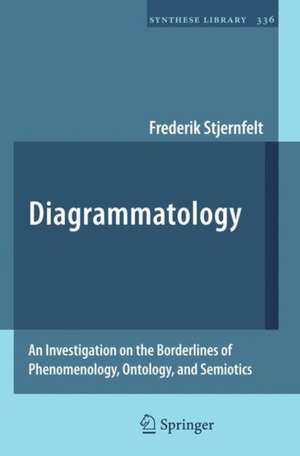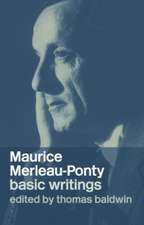Diagrammatology: An Investigation on the Borderlines of Phenomenology, Ontology, and Semiotics: Synthese Library, cartea 336
Autor Frederik Stjernfelten Limba Engleză Paperback – 6 noi 2010
The second part of the book focuses on three regional branches of semiotics: biosemiotics, picture analysis, and the theory of literature. Based on diagrammatology, these domains appear as accessible for a diagrammatological approach which leaves the traditional relativism and culturalism of semiotics behind and hence constitutes a realist semiotics.
| Toate formatele și edițiile | Preț | Express |
|---|---|---|
| Paperback (1) | 792.96 lei 6-8 săpt. | |
| SPRINGER NETHERLANDS – 6 noi 2010 | 792.96 lei 6-8 săpt. | |
| Hardback (1) | 1234.94 lei 6-8 săpt. | |
| SPRINGER NETHERLANDS – 27 iun 2007 | 1234.94 lei 6-8 săpt. |
Din seria Synthese Library
- 15%
 Preț: 638.43 lei
Preț: 638.43 lei - 18%
 Preț: 989.98 lei
Preț: 989.98 lei - 15%
 Preț: 596.69 lei
Preț: 596.69 lei - 18%
 Preț: 903.93 lei
Preț: 903.93 lei - 15%
 Preț: 586.88 lei
Preț: 586.88 lei - 15%
 Preț: 696.50 lei
Preț: 696.50 lei - 18%
 Preț: 892.90 lei
Preț: 892.90 lei - 15%
 Preț: 643.34 lei
Preț: 643.34 lei -
 Preț: 282.33 lei
Preț: 282.33 lei - 5%
 Preț: 372.19 lei
Preț: 372.19 lei -
 Preț: 443.10 lei
Preț: 443.10 lei - 15%
 Preț: 637.59 lei
Preț: 637.59 lei - 18%
 Preț: 958.88 lei
Preț: 958.88 lei - 15%
 Preț: 642.36 lei
Preț: 642.36 lei - 18%
 Preț: 1230.66 lei
Preț: 1230.66 lei - 15%
 Preț: 642.83 lei
Preț: 642.83 lei - 18%
 Preț: 1000.39 lei
Preț: 1000.39 lei -
 Preț: 389.70 lei
Preț: 389.70 lei - 15%
 Preț: 637.28 lei
Preț: 637.28 lei - 18%
 Preț: 952.26 lei
Preț: 952.26 lei - 18%
 Preț: 1231.32 lei
Preț: 1231.32 lei - 15%
 Preț: 645.96 lei
Preț: 645.96 lei -
 Preț: 395.85 lei
Preț: 395.85 lei -
 Preț: 400.47 lei
Preț: 400.47 lei - 18%
 Preț: 1225.48 lei
Preț: 1225.48 lei - 15%
 Preț: 638.89 lei
Preț: 638.89 lei - 18%
 Preț: 1232.09 lei
Preț: 1232.09 lei -
 Preț: 380.45 lei
Preț: 380.45 lei -
 Preț: 394.87 lei
Preț: 394.87 lei - 15%
 Preț: 640.37 lei
Preț: 640.37 lei - 15%
 Preț: 639.08 lei
Preț: 639.08 lei -
 Preț: 381.98 lei
Preț: 381.98 lei - 15%
 Preț: 643.00 lei
Preț: 643.00 lei - 15%
 Preț: 672.29 lei
Preț: 672.29 lei
Preț: 792.96 lei
Preț vechi: 967.03 lei
-18% Nou
Puncte Express: 1189
Preț estimativ în valută:
151.75€ • 157.85$ • 125.28£
151.75€ • 157.85$ • 125.28£
Carte tipărită la comandă
Livrare economică 14-28 aprilie
Preluare comenzi: 021 569.72.76
Specificații
ISBN-13: 9789400705319
ISBN-10: 940070531X
Pagini: 544
Ilustrații: XXII, 508 p.
Dimensiuni: 155 x 235 x 38 mm
Greutate: 0.76 kg
Ediția:2010
Editura: SPRINGER NETHERLANDS
Colecția Springer
Seria Synthese Library
Locul publicării:Dordrecht, Netherlands
ISBN-10: 940070531X
Pagini: 544
Ilustrații: XXII, 508 p.
Dimensiuni: 155 x 235 x 38 mm
Greutate: 0.76 kg
Ediția:2010
Editura: SPRINGER NETHERLANDS
Colecția Springer
Seria Synthese Library
Locul publicării:Dordrecht, Netherlands
Public țintă
ResearchCuprins
Diagrams – Peirce and Husserl.- Let’s Stick Together.- The physiology of arguments – Peirce’s extreme realism.- How to Learn More.- Moving Pictures of Thought.- Everything is Transformed.- Categories, Diagrams, Schemata.- Mereology.- Diagrammatical Reasoning and the Synthetic a Priori.- Biosemiotics, Pictures, Literature.- Biosemiotics as Material and Formal Ontology.- A Natural Symphony?.- Man the Abstract Animal.- The Signifying Body.- Christ Levitating and the Vanishing Square.- Into the Picture.- Small Outline of a Theory of the Sketch.- Who is Michael Wo-Ling Ptah-Hotep Jerolomon?.- Five Types of Schematic Iconicity in the Literary Text.- The Man Who Knew Too Much.
Recenzii
From the reviews:
"Diagrams will never be the same. A fascinating and challenging tour through phenomenology, biology, Peirce's theory of signs and Ingarden's ontology of literature, all neatly tied together through the guiding thread of the diagrammatical. A veritable tour de force." (Barry Smith, SUNY at Buffalo, U.S.A.)
"The volume Diagrammatology can and should be regarded as it is intended, as a controversial, indeed iconoclastic, contribution to semiotic inquiry. This book is undoubtedly significant, erudite, meticulous and fluent in writing. Its voluminous output is fully justified in scholarly and intellectual terms: this book represents a masterful achievement in semiotic studies, one that should find its place in tertiary libraries." (Geoffrey Sykes, International Journal for the Semiotics of Law, Vol. 21, 2008)
"Stjernfelt accomplishes a rarely achieved clearness in presenting key features of Peircean semiotics. In addition, this approach is rewarded by a true discovery that might prove to be of far reaching consequence." (Thomas Riese, Biosemiotics, Vol. 1, 2008)
"Peirce and Husserl were mathematicians who had common interests in language, ontology, and phenomenology. Yet the terminology they coined was so different that they misunderstood one another: each accused the other of 'psychologism'. With his meticulous scholarship, Frederik Stjernfelt shows that they had a closer affinity to one another than either had to Frege or Heidegger. In fact, the writings of each frequently illuminate and extend the insights of the other. This book shows that Peirce and Husserl were cultivating a broad and fertile common ground, which was largely neglected by both the analytic and the continental philosophers during the 20th century and which promises to be an exciting area of research in the 21st." (John F. Sowa, Croton-on-Hudson, U.S.A.)
"[...] Stjernfelt succeeds in at least two ways. First, he provides a key for an overall treatment of this very fascinating topic which in recent years has been investigated from the points of view of the most different and various fields of research. In doing so, he does not neglect the complexity of the topic but, on the contrary, shows all the different issues that can be connected with or elucidated by it. Secondly, he puts forward interpretations of Peircean semiotics and Husserlian phenomenology that stress similarities between the two, thereby opening up not only a series of questions about the evidence in support of his claims, but also a relatively new perspective that brings closer two traditions which until now have not been treated as deriving from similar ideas." (Valeria Giardino, Notre Dame Philosophical Reviews, July 2008)
"Diagrammatology offers - finally - a systematic articulation of the Peircean work on the diagram, in all its complex interconnections with other developments of pragmati(ci)sm." (Riccardo Fusaroli, Versus 106-108, 2009)
"Diagrams will never be the same. A fascinating and challenging tour through phenomenology, biology, Peirce's theory of signs and Ingarden's ontology of literature, all neatly tied together through the guiding thread of the diagrammatical. A veritable tour de force." (Barry Smith, SUNY at Buffalo, U.S.A.)
"The volume Diagrammatology can and should be regarded as it is intended, as a controversial, indeed iconoclastic, contribution to semiotic inquiry. This book is undoubtedly significant, erudite, meticulous and fluent in writing. Its voluminous output is fully justified in scholarly and intellectual terms: this book represents a masterful achievement in semiotic studies, one that should find its place in tertiary libraries." (Geoffrey Sykes, International Journal for the Semiotics of Law, Vol. 21, 2008)
"Stjernfelt accomplishes a rarely achieved clearness in presenting key features of Peircean semiotics. In addition, this approach is rewarded by a true discovery that might prove to be of far reaching consequence." (Thomas Riese, Biosemiotics, Vol. 1, 2008)
"Peirce and Husserl were mathematicians who had common interests in language, ontology, and phenomenology. Yet the terminology they coined was so different that they misunderstood one another: each accused the other of 'psychologism'. With his meticulous scholarship, Frederik Stjernfelt shows that they had a closer affinity to one another than either had to Frege or Heidegger. In fact, the writings of each frequently illuminate and extend the insights of the other. This book shows that Peirce and Husserl were cultivating a broad and fertile common ground, which was largely neglected by both the analytic and the continental philosophers during the 20th century and which promises to be an exciting area of research in the 21st." (John F. Sowa, Croton-on-Hudson, U.S.A.)
"[...] Stjernfelt succeeds in at least two ways. First, he provides a key for an overall treatment of this very fascinating topic which in recent years has been investigated from the points of view of the most different and various fields of research. In doing so, he does not neglect the complexity of the topic but, on the contrary, shows all the different issues that can be connected with or elucidated by it. Secondly, he puts forward interpretations of Peircean semiotics and Husserlian phenomenology that stress similarities between the two, thereby opening up not only a series of questions about the evidence in support of his claims, but also a relatively new perspective that brings closer two traditions which until now have not been treated as deriving from similar ideas." (Valeria Giardino, Notre Dame Philosophical Reviews, July 2008)
"Diagrammatology offers - finally - a systematic articulation of the Peircean work on the diagram, in all its complex interconnections with other developments of pragmati(ci)sm." (Riccardo Fusaroli, Versus 106-108, 2009)
Textul de pe ultima copertă
Diagrammatology investigates the role of diagrams for thought and knowledge. Based on the general doctrine of diagrams in Charles Peirce's mature work, Diagrammatology claims diagrams to constitute a centerpiece of epistemology. The book reflects Peirce's work on the issue in Husserl's contemporanous doctrine of "categorial intuition" and charts the many unnoticed similarities between Peircean semiotics and early Husserlian phenomenology. Diagrams, on a Peircean account, allow for observation and experimentation with ideal structures and objects and thus furnish the access to the synthetic a priori of the regional and formal ontology of the Husserlian tradition.
The second part of the book focusses on three regional branches of semiotics: biosemiotics, picture analysis, and the theory of literature. Based on diagrammatology, these domains appear as accessible for a diagrammatological approach which leaves the traditional relativism and culturalism of semiotics behind and hence constitutes a realist semiotics
Diagrams will never be the same. A fascinating and challenging tour through phenomenology, biology, Peirce's theory of signs and Ingarden's ontology of literature, all neatly tied together through the guiding thread of the diagrammatical. A veritable tour de force.
Barry Smith, SUNY at Buffalo, U.S.A.
With his meticulous scholarship, Frederik Stjernfelt shows that Peirce and Husserl were cultivating a broad and fertile common ground, which was largely neglected by both the analytic and the continental philosophers during the 20th century and which promises to be an exciting area of research in the 21st.
John F. Sowa, Croton-on-Hudson, U.S.A.
The second part of the book focusses on three regional branches of semiotics: biosemiotics, picture analysis, and the theory of literature. Based on diagrammatology, these domains appear as accessible for a diagrammatological approach which leaves the traditional relativism and culturalism of semiotics behind and hence constitutes a realist semiotics
Diagrams will never be the same. A fascinating and challenging tour through phenomenology, biology, Peirce's theory of signs and Ingarden's ontology of literature, all neatly tied together through the guiding thread of the diagrammatical. A veritable tour de force.
Barry Smith, SUNY at Buffalo, U.S.A.
With his meticulous scholarship, Frederik Stjernfelt shows that Peirce and Husserl were cultivating a broad and fertile common ground, which was largely neglected by both the analytic and the continental philosophers during the 20th century and which promises to be an exciting area of research in the 21st.
John F. Sowa, Croton-on-Hudson, U.S.A.
Caracteristici
The first scrutinization of Peirce’s general diagram doctrine Compares and integrates pragmatism and phenomenology; Peirce and Husserl Interdisciplinary study involving philosophy on the one hand and biology, art history and theory of literature on the other Presents a realist semiotics as opposed to strong anti-realist positions in the semiotic tradition Advocates a rational understanding of diagram use in thought
















